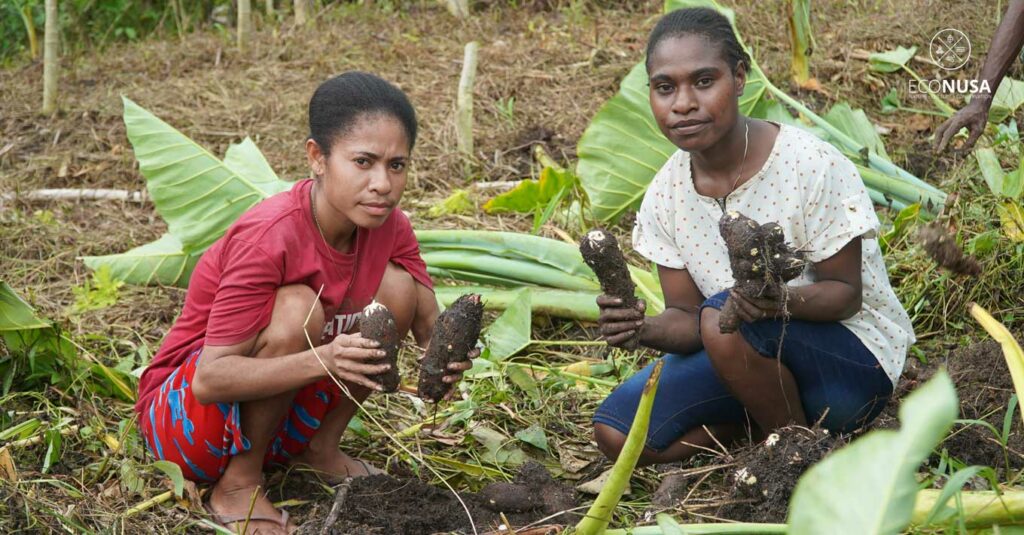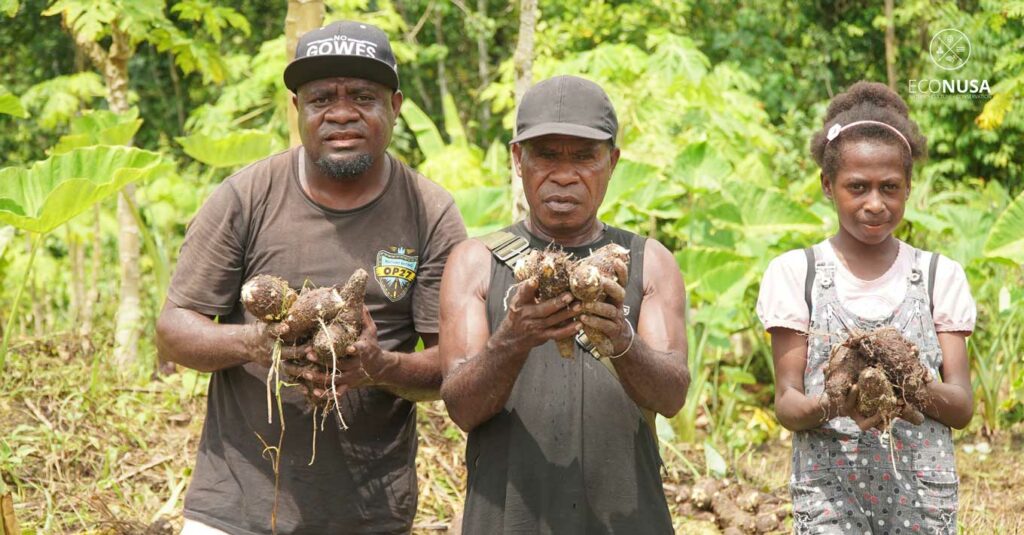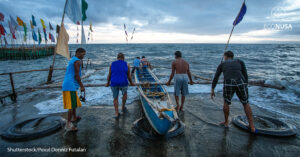
Taro is one of staple foods for communities in Tanah Papua. The communities usually make mashed taro as a source of main carbohydrate. Alternatively they also make taro chips as snacks. Many communities planted taro, one of them is the community in Klaflum Village in Konhir District, Sorong Regency, who have been cultivating taro over the past year. Recently they harvested the taro on Thursday, 7 December 2023.
Most of Klaflum residents gathered to harvest their taro garden. Approximately 2.5 tons of taro were harvested from 500 taro plants. They plan to consume some of the harvested crops, while the rest are planned to be sold to local business owners. “The income we’ll get from the crops will be used for our children’s school fees, also to fulfill our daily needs,” said Manase Malasmene, head of Taro Farmer Group.
Read Also: Om, Priceless Food for Ngalum Ok Tribe
The harvest in Klaflum Village is the result from the Social Transformation School program held by EcoNusa Foundation at Konhir District in 2022. Social Transformation School is both a program and an approach carried out by EcoNusa in collaboration with the local government to build village resilience through sustainable natural resource management.
In its implementation, village cadres who participated in Social Transformation School were assigned to learn about identifying and mapping village potential in order to create a program which will provide sustainable benefits for communities and villages. In Klaflum Village, the cadres chose taro commodities. With EcoNusa, Klaflum Village Government, and Sorong Regency Government support, Klaflum residents planted 5,000-6,000 taro seedling plants in an approximately 1 hectare of agricultural farm.

After a year of cultivation, Klaflum community harvested the taro gradually to ensure the sustainability of the sales. The harvest was attended by several parties, including the Head of the Sorong Regency Food Crops, Horticulture and Plantation Service, Frengky Wamafma; Head of Economics and Natural Resources; Head of Planning, Research and Development Agency; Vice Chairman of Malamoi Classis, Leonard Mainolo; Secretary of Konhir District, Yehud Gisim; Chief Executive of Ekklesia Church Congregational Council of Konhir District, Naftali Yadanfle; Klaflum, Klamne, Tarsa, Klarin, Klafyo, Mlaron villages communities, Caladium Entrepreneur Sinifagu Mibi and the EcoNusa teams.
Read Also: STS Tarsa, Collaborative Action to Develop Village
According to Frengky Wamafma, this harvest ignited the hope of local communities. They were really happy to be able to produce commodities to fulfill their daily needs. The Sorong Regency Government expressed their support for the collaboration between local government, community, and EcoNusa Foundation, to improve local community economy.
Frengky further said that the Sorong Regency Government will give more support to the community by providing regular agricultural training regarding land and plant processing to increase crop yields. “If the harvest result increases, our confidence will also increase that taro can be one of our sources of livelihood,” he said.
The Klaflum community is planning to plant taro again after the harvest. “Hereafter, we will clean the area and plant taro again. We aim to get more than the last harvest period,” said Meurets Kilmi, Secretary of Klaflum Village.
Editor: Nur Alfiyah, Swiny Adestika




